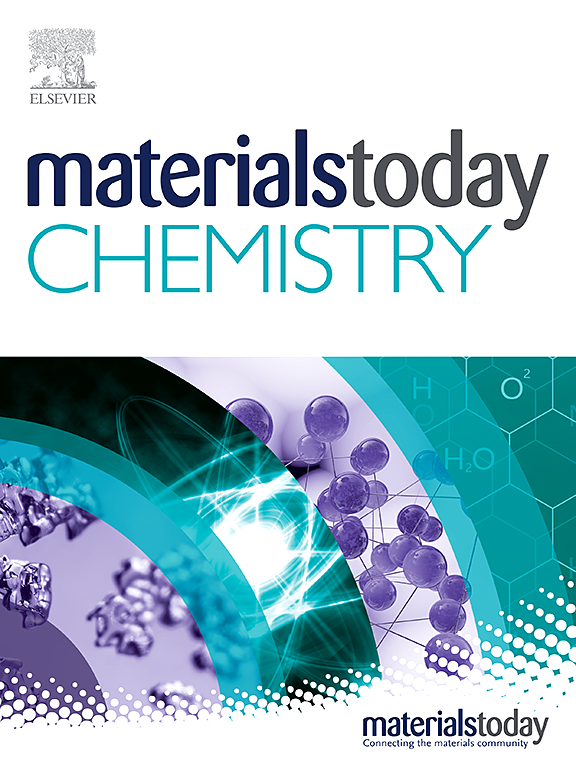Direct arylation-derived non-ionic star-shaped oligomeric CIL materials with Dramatically reduced work functions for organic solar cells
IF 6.7
2区 化学
Q1 CHEMISTRY, MULTIDISCIPLINARY
引用次数: 0
Abstract
Although numerous photoactive layer materials have been explored for organic solar cells (OSCs), the cathode interface layer (CIL) materials still largely lag behind, however. Till now, ionic perylene diimide (PDI) derivatives are one of the most representative conjugated small molecules CIL materials for OSC. In this study, three new non-ionic star-shaped oligomeric CIL materials named , and involving 1,3,5-tribromo-2,4,6-trifluoro-benzene building, cyclopentadithiophene, rhodamine and 2-(5,6-difluoro-3-oxo-2,3-dihydro-1H-inden-1-ylidene)malononitrile blocks were designed and facilely synthesized atom-economic direct C–H arylation for OSC. In the follow-up study of structure-property correlation, it was found that all three molecules possess the deepened work function (WF). show good electron transport, and are introduced into the PM6:Y6 system to further explore its effect as CIL that, can effectively suppress charge recombination. Among them, has the best effect of reducing the WF, which reduces the WF of the Ag electrode from 4.30 eV to 3.41 eV. Owing to its deepest WF and best alcoholic processability. The -based devices achieve a highest-power conversion efficiency (PCE) of 14.53 %, corresponding to a of 0.85 V, a of 25.17 mA cm, and an FF of 67.21 %. Our work opens up a new direction for non-ionic, non-PDI and non-fused ring star-shaped CIL materials, and thus diversify the CIL materials.直接芳基化衍生的非离子星形低聚物 CIL 材料可大幅降低有机太阳能电池的功函数
尽管有机太阳能电池(OSC)的光活性层材料已被探索出许多,但阴极界面层(CIL)材料在很大程度上仍然落后。迄今为止,离子型过二亚胺(PDI)衍生物是有机太阳能电池中最具代表性的共轭小分子 CIL 材料之一。本研究设计了三种新型非离子星形低聚物 CIL 材料,分别命名为Ⅳ、Ⅴ和Ⅵ,其中涉及 1,3,5-三溴-2,4,6-三氟苯构建体、环五噻吩、罗丹明和 2-(5,6-二氟-3-氧代-2,3-二氢-1H-茚-1-亚基)丙二腈嵌段,并通过原子经济直接 C-H 芳基化法方便地合成了用于 OSC 的 CIL 材料。在后续的结构-性能相关性研究中,发现这三种分子都具有深化的功函数(WF),表现出良好的电子传输性能,并将其引入 PM6:Y6 体系中,进一步探讨其作为 CIL 的效果,即可以有效抑制电荷重组。其中,银电极的功函数从 4.30 eV 降至 3.41 eV,降低功函数的效果最好。由于其最深的 WF 值和最佳的酒精加工性。该器件的最高功率转换效率(PCE)为 14.53%,对应的 a 值为 0.85 V,a 值为 25.17 mA cm,FF 值为 67.21%。我们的工作为非离子、非 PDI 和非熔融环形星状 CIL 材料开辟了一个新方向,从而丰富了 CIL 材料。
本文章由计算机程序翻译,如有差异,请以英文原文为准。
求助全文
约1分钟内获得全文
求助全文
来源期刊

Materials Today Chemistry
Multiple-
CiteScore
8.90
自引率
6.80%
发文量
596
审稿时长
33 days
期刊介绍:
Materials Today Chemistry is a multi-disciplinary journal dedicated to all facets of materials chemistry.
This field represents one of the fastest-growing areas of science, involving the application of chemistry-based techniques to the study of materials. It encompasses materials synthesis and behavior, as well as the intricate relationships between material structure and properties at the atomic and molecular scale. Materials Today Chemistry serves as a high-impact platform for discussing research that propels the field forward through groundbreaking discoveries and innovative techniques.
 求助内容:
求助内容: 应助结果提醒方式:
应助结果提醒方式:


